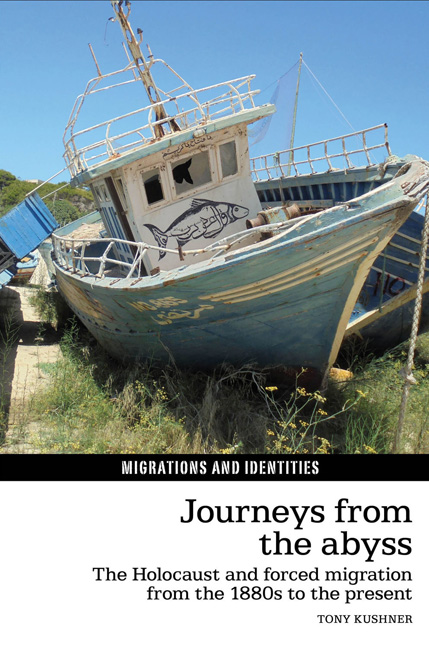Book contents
- Frontmatter
- Dedication
- Contents
- Preface and Acknowledgments
- Introduction: Migration and the Holocaust
- Part 1 Gender, Forced Migration, and Testimony: From ‘White Slavery’ to ‘Trafficking’ via Refugee Domestic Servants
- Part 2 Place, Performance, and Legality: Holocaust Survivors and Other Migrant Journeys in the Long Twentieth Century
- Chapter 3 The Journeys of Child Refugees, Lost and Rediscovered
- Chapter 4 The Ship and the Battle over Migrant ‘Illegality’
- Conclusion
- Bibliography
- Index
Chapter 3 - The Journeys of Child Refugees, Lost and Rediscovered
from Part 2 - Place, Performance, and Legality: Holocaust Survivors and Other Migrant Journeys in the Long Twentieth Century
- Frontmatter
- Dedication
- Contents
- Preface and Acknowledgments
- Introduction: Migration and the Holocaust
- Part 1 Gender, Forced Migration, and Testimony: From ‘White Slavery’ to ‘Trafficking’ via Refugee Domestic Servants
- Part 2 Place, Performance, and Legality: Holocaust Survivors and Other Migrant Journeys in the Long Twentieth Century
- Chapter 3 The Journeys of Child Refugees, Lost and Rediscovered
- Chapter 4 The Ship and the Battle over Migrant ‘Illegality’
- Conclusion
- Bibliography
- Index
Summary
Place, Heritage, and Child Refugees
‘The identity of places is very much bound up with the histories which are told of them, how those histories are told, and which memory turns out to be dominant.’ Doreen Massey's comments are especially salient with regard to the presence of refugees – how do we remember and historicise those who, by circumstances beyond their control, are transient and placeless? The previous Part of this book charted the slow, uneven, and incomplete process by which refugee domestics established themselves in Britain in their attempt to recreate a place called home (if, in many cases, only temporarily so, as they continued searching for a new life in the Americas, Israel, and elsewhere). In their testimony, the spectre of the Holocaust has grown as time has passed. Yet the actual journeys to destruction of friends and relatives left behind was rarely confronted, being too painful to contemplate.
In 2014 the ‘Prime Minister's Holocaust Commission’ announced its terms of reference to ‘ensure that Britain has a permanent and fitting memorial to the Holocaust’. One of its key objectives was to include ‘a clear focus on the role that Britain played through, for example, the Kindertransport, the liberation of Bergen-Belsen and the experiences of survivors now living in Britain’. It is revealing that there is no mention made of the 20,000 Jewish refugee domestics in this self-congratulatory list, even though it brought double the number of refugees than the Kindertransport and ten times that of Holocaust survivors who came after the war. No doubt the exploitation associated with the early refugee years in service has made it problematic as a usable, self-eulogising past. It is a narrative that does not fully confirm Britain's self-image of being free, fair, and generous.
The ambiguity of the domestic permit scheme has led it to be inconspicuous, eclipsed especially by celebratory Kindertransport memory. It is thus not surprising that places and events that fundamentally query the self-assuredness connected to innate British decency, especially in relation to Nazism, the Second World War, and the nation's ‘finest hour’, have been further marginalised and subject to amnesia.
- Type
- Chapter
- Information
- Journeys from the AbyssThe Holocaust and Forced Migration from the 1880s to the Present, pp. 157 - 222Publisher: Liverpool University PressPrint publication year: 2017



